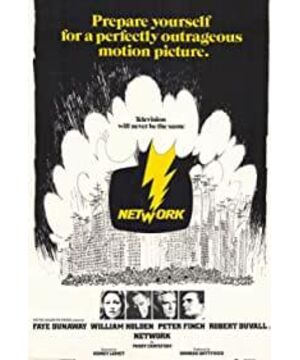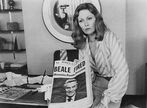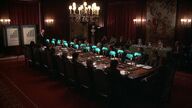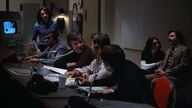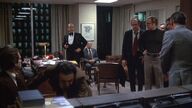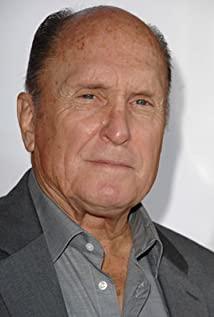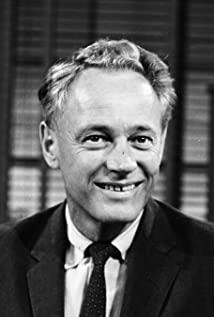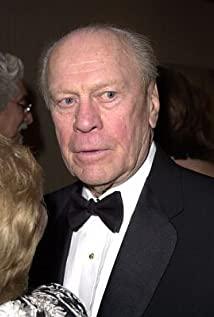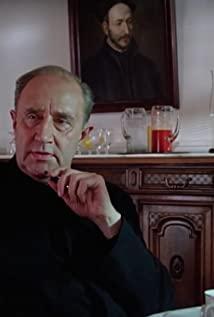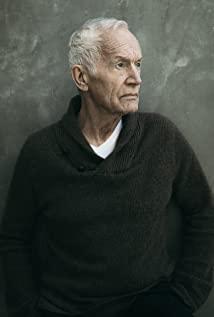Some people say that if you can understand a classic movie, you can understand an era. It is true that reflecting the characteristics of the times is a prerequisite for whether a work of art can become a classic. How to reflect? In what form? It is the best embodiment of testing the level of the creator of a movie. The real film masters are critics and prophets, and the way "TV Situation" chooses is very simple, just four words: hysteria.
All the people, all the things, are intertwined in hysteria. The whole movie goes on in an orderly manner in hysterical madness, and behind the eloquence is a kind of maniacal morbidity, when this state reaches its peak, even with the rout of the times and the success of the film. Absurd greed for profit, and fleeing from the other side to watch the fire, when the world is framed by a fluorescent screen and entertainment becomes the only sustenance of human nature, the world is just a business. In this sense, the only difference between the 70s and the 21st century is that sickness has become the norm.
Of all the hysteria, the most hysterical one must be Diana, who wants to be a gold medal producer. For Diana, her lover, Max, in the episode she parted with, I think it's fair to say: "You need me because I'm the last real person you touch. You're the embodiment of TV. Indifferent to pain, dull to pleasure, life is just ordinary rubble. War, murder, death are like a few bottles of beer to you, everyday life is like a comedy full of holes, you Even the sense of time and space is scattered into moments and instant replays...you're crazy, Diana, you're insane to the core. Everything you touch will disappear with you..." Here's the look The generation that grew up on TV draws all its values from TV. As a program producer, Diana only has things in mind about ratings and activation rates. Even when dating and eating, there are no sweet words in her mouth, it’s all about the planning of the program , it is these things that fascinate her, that she loves, that excites her. Compared to the executives of the businessmen, she is a machine that succumbs to the TV show. She recruited those revolutionaries not to promote political theories, but to use their own controversy to gain ratings. She has absolutely no sense of justice, and doing these things is nothing more than to prove that she is a successful producer. So in the end, when she conspired with the executives to murder Howard because of the ratings, she was indifferent and determined like a stone.
In the field of communication, Japanese scholar Yujiro Lin once put forward the concept of "TV person" in "Information Society: The Transformation from Hardware Society to Software Society". The so-called "TV people" refers to a generation born and grown with the popularization of TV. They grew up in the sensory stimulation environment of TV pictures and audio. They are "feeling people" who pay attention to feeling. "Go with the feeling". At the same time, he pointed out that because watching TV is carried out in a small space with their backs to the sofa and facing the screen, this closed environment and lack of real social interaction make most of them develop loneliness, introversion and self-centeredness. character, and a weak sense of social responsibility. The establishment of the concept of "television man" is based on the criticism of "media dependence", which is characterized by indulging in the media, unable to extricate themselves, value and behavior choices must be based on the media, and being satisfied with the virtual social interaction in the media And avoid the reality of social interaction and so on. From these points of view, Diana in "TV" is clearly a standard "TV person".
Coincidentally, this kind of research on media dependence is still of great significance today. With "TV people", there will definitely be "computer people", "Internet people", and "mobile phone people". With sharp satire, "TV Station" not only expresses the reality of American society at that time, but also predicts the future of human beings. The powerful negative effects of excessive media dependence. Today, with the rapid expansion of the TV and Internet industries, everyone's life has changed more or less. We have begun to believe in and be fascinated by the virtual world. What can this world bring us? Is it a sensory stimulus that cannot be experienced in real life? Or step by step toward the abyss of loss of self? We can only say that the attributes of media technology itself are neutral, and there is no right or wrong. Media tools are human creations. What matters is how people use them, what they use to spread, and what social goals they achieve. . Therefore, changing from the person who is the main body of communication is the fundamental solution to this media dependence.
View more about Network reviews


